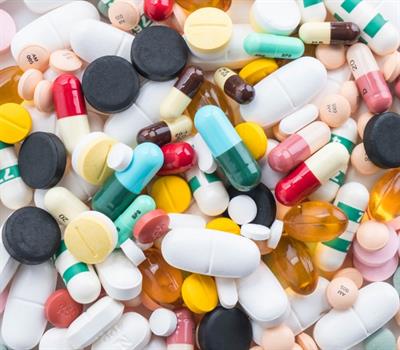PDF chapter test TRY NOW
Microbes in the field of medicine:
Alexander Flemingwas working on a disease-causing bacteria culture in 1929. When he returned to his laboratory after a vacation, he found spores of green mould, otherwise known as fungus Penicillium notatum, contaminated the petri dishes of bacteria. He noticed that the presence of mould, inhibited the bacterial development. Also, many of these bacteria were destroyed by this fungi. He published his work and named the mould juice that kills many of the bacteria in his laboratory - Penicillin, a well-known antibiotic.

Antibiotic tablets
Microorganisms are the source of antibiotics and vaccines.
Antibiotics:
The word "antibiotic" is derived from the Greek words "anti", which means "against," and "bios", which means "life" (a bacterium is a life form).
Antibiotics are metabolic products of microorganisms, with low concentration are inhibitory or harmful to other microbes.
Penicillin is the first antibiotic derived by Alexander Fleming from Penicillium notatumin 1929, a type of fungi used to treat infectious diseases caused by microbes. In human beings, antibiotics control contagious diseases like cholera, diptheria, pneumonia, typhoid, etc.
Antibiotics produced by microorganisms:
Class of microorganisms | Type of microorganism | Antibiotic produced |
| Bacteria | Streptomyces griseus | Streptomycin |
| Bacteria | Streptomyces erythreus | Erythromycin |
| Bacteria | Bacillus subtilis | Bacitracin |
| Fungi | Penicillium notatum | Penicillin |
| Fungi | Cephalosporium acremonium | Cephalosporin |
Video explaining how antibiotic works
Vaccines:
Vaccines are prepared by killing, weakened or making the microbes inactive (attenuated).
Several diseases, including cholera, tuberculosis, smallpox and hepatitis, can be prevented by vaccination. Edward Jenner introduced the vaccination for smallpox in 1798. Many vaccines have been developed for distinct viral diseases, e.g.Polio, Measles, Hepatitis-A and B, Diphtheria, Pneumococcal, Influenza, etc.
How vaccines work?
Vaccines produced against diseases:
Types of vaccine | Name of the vaccine | Disease |
| Live attenuated | MMR | Measles, Mumps, Rubella |
| Inactivated (Killed antigen) | BCG (Bacillus Calmette Guerin) | Tuberculosis |
| Inactivated (Killed antigen) | Inactivated polio virus (IPV) | Polio |
| Subunit vaccines (purified antigens) | Hepatitis B vaccine | Hepatitis B |
| Toxoid (Inactivated antigen) | Tetanus toxoid (TT) | Tetanus |
| Toxoid (Inactivated antigen) | Diphtheria toxoid | Diphtheria |
